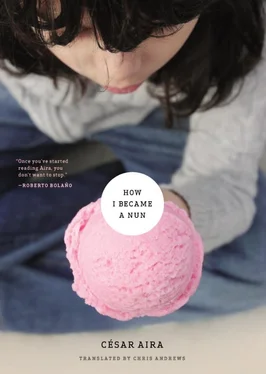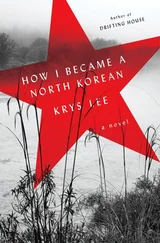César Aira
How I Became A Nun
MY STORY, THE STORY of “how I became a nun,” began very early in my life; I had just turned six. The beginning is marked by a vivid memory, which I can reconstruct down to the last detail. Before, there is nothing, and after, everything is an extension of the same vivid memory, continuous and unbroken, including the intervals of sleep, up to the point where I took the veil.
We had moved to Rosario. For the first six years of my life, Mom, Dad and I lived in the province of Buenos Aires, in a town of which I have no recollection and to which I have not returned since: Coronel Pringles. The big city (as it seemed, by contrast) made an enormous impression on us. Within a few days of our arrival, my father kept a promise he had made: to buy me an ice cream. It was to be my first, since ice cream was not to be had in Pringles. Dad, who had been to the city as a young man, had on various occasions sung the praises of this delicacy, which he remembered as a glorious treat, although he was not able to put its special charm into words. He had described it to me, quite rightly, as something the uninitiated could not imagine, and that was all it took to plant “ice cream” in my childish mind, where it grew, taking on mythic proportions.
We made our way on foot to an ice-cream store that we had noticed the previous day. In we went. Dad ordered a fifty-cent ice cream for himself, with scoops of pistachio, sweet cream, and whisky-kumquat; for me, he ordered a ten-cent cone with a single scoop of strawberry. I loved the pink color. My frame of mind was positive. I was a devoted daughter. Dad could do no wrong in my eyes. We sat down on a sidewalk bench, under the trees (there were plane trees back then in downtown Rosario). I watched how Dad was doing it; in a matter of seconds he had disposed of his scoop of green ice cream. I dipped my little spoon in with great care and lifted it to my mouth.
No sooner had the first particles dissolved on my tongue than I felt physically ill. I had never tasted anything so revolting. I was rather fussy about food and had mastered the art of feigning disgust when I didn’t feel like eating, but this went beyond anything I had ever tasted; it more than justified my worst exaggerations, even the ones I had refrained from acting out. For a fraction of a second I considered pretending. Dad had set his heart on making me happy, which was unusual, given his distant, irascible nature, averse to displays of affection, so it seemed a sin to spoil the occasion. I briefly envisioned the horrific prospect of eating the whole ice cream just to please him. It was only a thimbleful, the tiniest, kiddie-size cup, but at that moment it might as well have been a ton.
I don’t know if my heroism would have stretched that far, but I didn’t get a chance to put it to the test. The first mouthful provoked an involuntary grimace of disgust; Dad couldn’t help but see. The grimace was almost exaggerated, expressing both the physiological reaction and its accompanying emotions: disillusion, fear, and the terrible sadness of being unable to bond with my father, even in the pursuit of a simple pleasure. Trying to hide it would have been absurd; even today, I couldn’t hide it if I tried, because that grimace is still there on my face.
“What’s wrong?”
Everything that was going to happen was audible in his tone.
Under normal circumstances I would have burst out crying at this point and been unable to reply. Like many hypersensitive children, I was perpetually on the verge of tears. But that horrendous taste, having descended into my throat, rose again like a backlash and sent a sudden shock through my body.
“Uggh …”
“What?”
“It’s … awful.”
“It’s what?”
“Awful!” I shrieked in desperation.
“You don’t like the ice cream?”
I remembered him saying as we walked to the store, among other remarks infused with pleasant anticipation, “We’ll find out if you like ice cream.” Naturally he said this assuming that I would. Don’t all children? Some adults even remember their childhood as little more than a perpetual begging for ice cream. Which is why there was a tone of incredulous fatalism to his question, as if to say: “I don’t believe it: even in a simple thing like this you’re going to let me down.”
I could see the indignation and scorn building in his eyes, but he controlled himself. He decided to give me another chance.
“Eat it. It’s yummy,” he said, and to prove it he scooped up a spoonful from his cone and put it into his mouth.
It was too late for me to back down now. The die was cast. In a way I didn’t want to back down. I was beginning to realize that my only hope, having come this far, was to prove to Dad that what he had in his hands was revolting. I looked in horror at the pink of the ice cream. Farce was beginning to impinge on reality. Worse than that: farce was becoming reality, right in front of me, through me. I felt dizzy, but there was no turning back.
“It’s awful! It’s sickening!” I tried to whip myself into a frenzy. “It’s foul!”
He said nothing. He stared into the empty space in front of him and quickly ate his ice cream. I was obviously getting nowhere, again. So, in a panic, I changed tack abruptly.
“It’s bitter,” I said.
“No, it’s sweet,” he replied with a forced and threatening gentleness.
“It’s bitter!” I shouted.
“It’s sweet.”
“It’s bitter!!”
Dad had already given up hope of getting any satisfaction from the outing. Sharing a pleasure and a moment of companionship: it was too late for all that now, and he must have been wondering how he could have been so naïve, how he could ever have thought it possible. And yet, just to rub salt into his own wound, he set about trying to convince me of my mistake. Or to convince himself that I was his mistake.
“It’s a very sweet strawberry-flavored ice cream — delicious.”
I shook my head.
“No? So what flavor does it have then?”
“It’s horrible!”
“I think it’s delicious,” he said calmly, gulping down another spoonful. His calmness was the most frightening thing of all.
My attempt to make peace was typically convoluted:
“I don’t know how you can enjoy that junk,” I said, in what was supposed to be an admiring tone of voice.
“Everyone likes ice cream,” he said, white with rage. The mask of patience was slipping, and I don’t know how I managed to hold back my tears. “Everyone except you, son, because you’re a moron.”
“No, Dad! I swear!”
“Eat that ice cream.” (Coldly, sharply.) “I bought it for you to eat, you little moron.”
“But I can’t …!”
“Eat it. Try it. You haven’t even tried it.”
Opening my eyes wide at this slur on my honesty (only a monster would have lied for the fun of it), I cried, “I swear it’s horrible!”
“Of course it’s not horrible. Try it.”
“I tried it already. I can’t!”
Then he had an idea. He reverted to a condescending tone. “You know what it is? The coldness gave you a shock. Not the taste, but how cold it is. You’ll soon get used to that, and then you’ll realize how delicious it is.”
I clutched at that straw. I wanted to believe in that possibility, which would never have occurred to me in a thousand years. But deep down I knew it was hopeless. It wasn’t the coldness. I wasn’t accustomed to ice-cold drinks (we didn’t have a freezer) but I had tried them, and I knew it wasn’t the coldness. Even so, I clung to that explanation. With extreme care I took a tiny scrape of ice cream on the tip of the spoon, and mechanically raised it to my mouth.
Читать дальше












